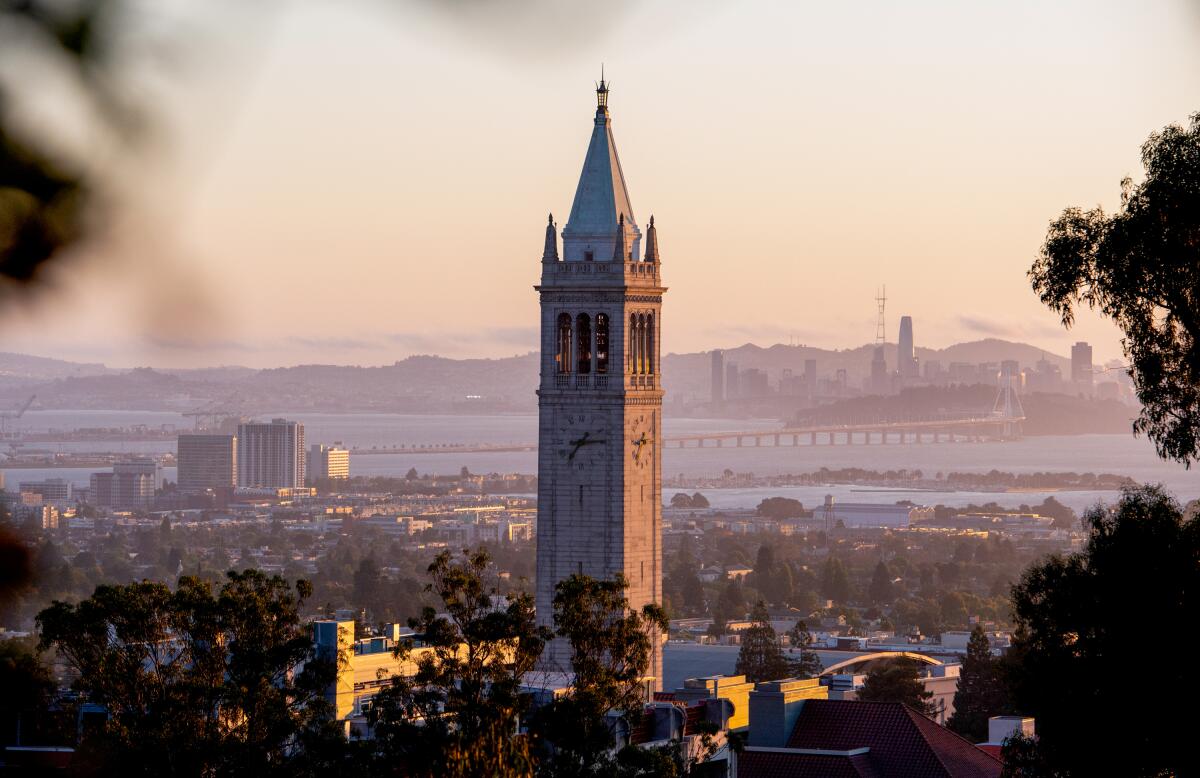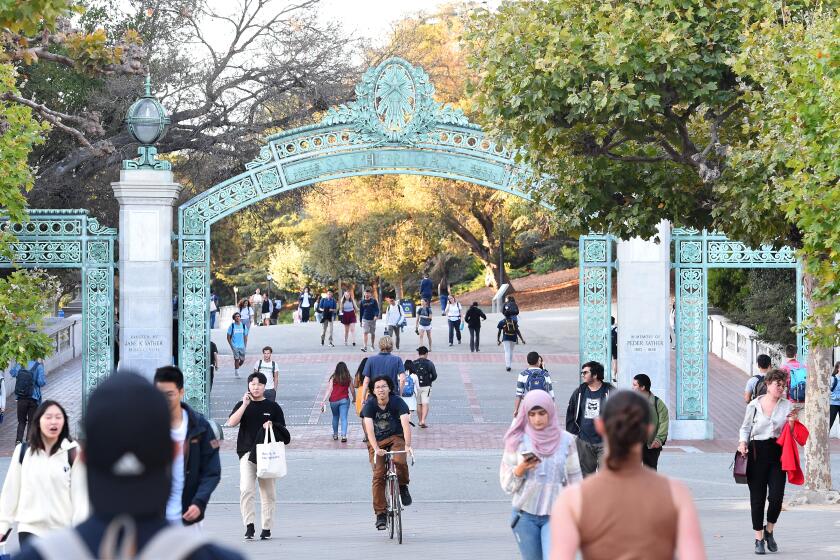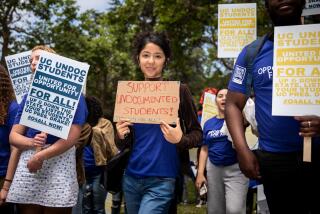Newsom urges state high court to avert looming cut of 3,050 students at UC Berkeley

- Share via
Ramping up the drama over looming enrollment cuts at UC Berkeley, Gov. Gavin Newsom on Friday urged the California Supreme Court to stay a lower court order that would force the campus to slash its incoming fall class by one-third, or 3,050 seats.
“We can’t let a lawsuit get in the way of the education and dreams of thousands of students who are our future leaders and innovators,” Newsom said in a statement. “I urge the Supreme Court to step in to ensure we are expanding access to higher education and opportunity, not blocking it.”
Newsom’s amicus letter, submitted by state Atty. Gen. Rob Bonta, told the Supreme Court that the lives of thousands of deserving students would be “irrevocably altered” if denied the opportunity to attend UC Berkeley.
The high court is weighing the University of California’s appeal to stay an Alameda County Superior Court judge’s order to the campus to roll back enrollment to its 2020-21 level in response to a Berkeley community group’s lawsuit. University officials said that would require them to reduce admission offers by 5,100 for fall 2022 and cut back financial aid due to a loss of $57 million in tuition revenue.
The University of California is appealing to the state Supreme Court to stay a lower court ruling that froze enrollment, which would allow Berkeley to avert any cuts in its planned admission targets for fall.
The letter added that expanding access to college, particularly high-demand campuses in the top-rated UC system, was a top state priority and a “keystone” of Newsom’s higher education vision on college access, affordability, equity and innovation.
“The State’s public higher education system drives equitable and upward mobility, helping first-generation and lower-income Californians realize their full educational and professional potential,” the letter said. “It also prepares the workforces needed to secure the state’s current and future economic success and confront its hardest challenges, including the climate crisis and global pandemics.”
Denying admission to students who would otherwise be accepted would damage their lives and undermine the state’s interests, Newsom’s letter said. “UC Berkeley provides an unmatched opportunity for low-income students, students from diverse backgrounds, and transfer students to access a high-quality education at a prestigious university at public-school tuition rates.”
Save Berkeley’s Neighborhoods, the community nonprofit that filed the lawsuit, has dismissed these assertions as hyperbole, saying that California students could be protected by cutting admissions to international and out-of-state students. Phil Bokovoy, the nonprofit’s president, also said the university is to blame for the crisis by not adequately reviewing the impact on housing, noise and trash as it enrolled 11,000 more students than it projected in its long-range development plan.
In August, Alameda County Superior Court Judge Brad Seligman agreed with the neighborhood group that Berkeley had not adequately analyzed the impacts and ordered the university to redo its review. He ordered the enrollment cap until the review is completed.
The CEQA lawsuit stopping UC Berkeley from expanding enrollment shows it’s too easy to exploit California’s main environmental law.
The governor’s entry into the fierce court fight over UC Berkeley’s enrollment underscores the enormous stakes at hand. Others joined the full-court legal press with their own amicus briefs supporting the UC Board of Regents’ appeal Friday, including the city of Berkeley and the Bay Area Council.
UC, in its appeal to the high court, said the enrollment cap would prove particularly “catastrophic” to the top-rated public research university’s goal to admit more low-income, underrepresented students. That’s because cutting the incoming class by one-third would force the campus to reassess its selections and delay the release of admission decisions, giving low-income students less time for financial advising before the May 1 commitment deadline.
Newsom said the state values expanding college access so much that it invested $47.1 billion for higher education, the largest single-year investment ever, in the last enacted budget. In his proposed 2022-23 budget, Newsom has provided funding to increase UC seats for California students by more than 7,000, including hundreds more seats annually at high-demand UC Berkeley, UCLA and UC San Diego, from 2023-24 through 2026-27. The California State University system would receive funding for 14,000 additional seats during that time.
UC and Cal State have agreed, in turn, to close equity gaps in graduation, expand access for transfer students, improve college affordability, and provide more graduates for the state’s high-need fields of climate action, healthcare, education and technology.
“The Court of Appeal’s decision would undermine these longstanding priorities of the State...,” Newsom’s brief said. “Because the Governor strongly supports providing access to education for all, and the enrollment restriction could unjustly eliminate the opportunity for enrollment and education for over 5,000 individual students, the Governor respectfully urges this Court to issue a stay while the case proceeds on its merits.”
More to Read
Sign up for Essential California
The most important California stories and recommendations in your inbox every morning.
You may occasionally receive promotional content from the Los Angeles Times.












